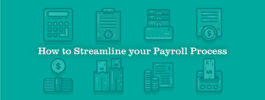In general, most Canadian-controlled private corporations that claim the Small Business Deduction are required to pay tax at the net rate of 10%. For other kinds of corporations, the tax rate is 15% after a general tax reduction. Without the tax reduction, the basic rate of Part I tax is 38%. However, there are many different deductions that your company or corporation can avail, depending on what type of corporation it is classified as. When it comes to corporate tax, many Canadian-controlled private corporations (CCPCs) enjoy many benefits associated with corporate income tax deductions.
Operating expenses
Operating expenses are nothing but customary tax deductions. As the name suggests, these include several day-to-day business expenses that enable a business to run smoothly. Payroll, rent, office supplies and office vehicles can be classified as operating expenses and can also be shown as so for a legitimate tax reduction.
Employee Expenses
Most businesses are permitted to deduct particular employee-related expenses in the form of health benefits and employee salaries. Pay that is distributed as a bonus, vacations, awards, sick leave or tuition reimbursement can also form a part of tax deductible. Employers who reimburse employees for work-related expenses like business travel or for using the vehicle for business can also receive tax deductions.
Insurance
Insurance premiums qualify for corporate tax deductions. Insurance premiums for fire and theft insurance are deductible. Liability and worker’s compensation insurance premiums also qualify for tax deductions. Business owners who operate a professional trade such as an accountant, attorney or doctor can deduct malpractice or errors and omissions insurance premiums from their taxes as well.
Travel expenses
Any kind of expenditure incurred as a result of local or long distance travel for business purpose can be claimed as a corporate tax deductible. You can also include air travel or local transport in this category. Any entertainment expenses including means and gratuities can be added to tax deductibles too.
Bad Debts
Organizations who can manifest bad debts in their account books are liable for a bad debt tax deduction. Many corporations exercise the option to write off debts that they have not been able to solve or even losses that have arisen from credit sales from customers. These can be claimed in tax deductibles.
Interest
Any kind of interest that an organization may have incurred as a result of a business loan or other forms of credit which are acquired to fund business expenses are ordinarily a tax deduction. Corporations can claim a full tax deduction on such an interest amount.
Equipment
Many corporations use various forms of business equipment and have a business place. Both these are tax deductible. The CRA will typically need any corporate to expand their deductible cost of business property out, over a period of time. For this, businesses are allowed to only deduct a depreciated amount of the property in most cases.
Common Tax Mistakes That Professional Corporations Make
Filing taxes and maintaining proper account records is one of the most significant pain points of many private professionals and small business owners, especially when they do not hire a professional business accountant. Failing to maintain appropriate records can sometimes lead to hefty fines and penalties over a period of time. Some of the most common mistakes that business owners and private professionals tend to make in maintaining their accounts are:
Tax Preparer vs. Accountant
A majority of small businesses or professional corporations usually have tax preparers. They are not accounting professionals. Usually, tax preparers are people who know how to prepare returns for filing, based on the information provided by the business owners. Most tax preparers do not cross verify or examine details of the information supplied by the business owners. They do not check any tax compliance assessments either.
With complexities and intricacies involved in tax filing, today’s business owners need accountants who are also adept at handling tax planning, corporate tax structures, ensuring tax compliance in addition to the first tax filing procedures. Many private businesses lose out on excellent tax saving opportunities as their accountants do not have any knowledge about them.
Shareholder Structure
One of the critical ingredients for appropriate tax planning, looking at future challenges and opportunities from taxation and legal perspective is understanding the shareholder structure of a corporation.
Shares-Common voting vs. Preferred non-voting
For most incorporated professionals, an individual can hold common shares while their other family members may only qualify for non-voting preferred shares. This aspect is quite critical to give different amounts in dividends for tax planning. In addition, small businesses that have a family structure need to make sure that their shares are organized from the very onset, keeping in mind the flexibility required to pay different amounts to several shareholders. This can also impact the LCGE (Lifetime Capital Gains Exemption). In cases where family members are not shareholders and are actively involved in the business, the approach is a bit different. When the company is being sold, they would probably not qualify for the exemption. This will mean that although one common shareholder would be exempted, the remaining amount would still be subject to tax on 50% of the capital gains.
Another case in point is when dividends can be a better tax strategy for income splitting. For both multiple or single shareholder scenarios, one can avail up to $40,000 in tax-free dividends. Although it is possible that proposed changes can lead to slight differences for incorporated professionals and traditional small business owners, they still need to be regarded within the framework of current regulations and tax changes.
Shareholder Agreements
Another key is to reclaim and take back shares of spouses in case of anticipated disputes. Close to 50% of marriages in Ontario are ending in divorce which makes it imperative to keep this aspect in mind. Incorporated professionals and business owners need to carefully consider that one spouse may not be one of the primary contributors to the business.
There are many critical aspects that professional corporations have to consider when taxation is considered. One of the best solutions to avoiding any tax penalties and complications is to hire professional accounting services which not only deal with numbers but also are well versed with the taxation and tax implications pertaining to unique business scenarios.


















